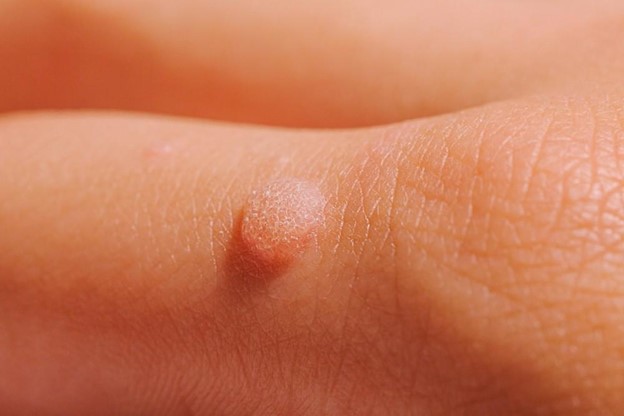Warts are common skin growths caused by a viral infection in the top layer of the skin. They are usually harmless but can be bothersome and unsightly. This comprehensive guide covers everything you need to know about warts, including their appearance, causes, contagiousness, treatment options, and more.
What are warts?
Warts are common, benign skin growths caused by the human papillomavirus (HPV). They can appear on any part of the body but are most frequently found on the hands, feet, and face. The texture of a wart can vary; they might be rough, grainy, or smooth and can appear as raised bumps or flat lesions. While warts are generally harmless and often resolve on their own, they can be unsightly and sometimes painful, particularly when located on areas subject to pressure or friction.
There are several types of warts, each classified based on the area they affect and their appearance. Common warts typically grow on the fingers and toes, plantar warts are found on the soles of the feet, and flat warts can appear on the face, thighs, or arms. Understanding what does a wart look like can help in identifying the type and choosing the appropriate treatment strategy.
Wart look like?
Warts can vary significantly in their appearance, which sometimes makes them challenging to identify. Here’s what to look for when trying to determine if a growth is a wart:
– Texture: Warts are often rough to the touch, though they can also be smooth, particularly in the case of flat warts.
– Shape and Size: They can appear as small, grainy bumps or larger, cauliflower-like growths. Common warts are usually round or oval and can be as small as a pinhead or as large as a pea.
– Color: Warts are typically the same color as your skin, but they can also be darker or lighter. Plantar warts, found on the soles of the feet, may have a gray or brown hue.
– Number: Warts can appear singly or in clusters. When multiple warts grow in a small area, they can merge to form a larger, mosaic-like pattern.
What causes warts?
Warts are primarily caused by an infection with the human papillomavirus (HPV), a highly contagious virus with numerous strains, each responsible for different types of warts. Here’s a deeper look into the causes and transmission of warts:
– HPV Infection: The virus invades the outer layer of skin, usually through tiny cuts or abrasions. Once inside, HPV causes rapid growth of cells on the outer layer of skin, leading to the formation of a wart.
– Direct Contact: Warts are spread by direct contact with a wart or something that touched a wart. This can happen through personal interactions or by touching objects used by a person with warts, such as towels or workout equipment.
– Autoinoculation: If you have a wart, you can spread it to other parts of your body. Touching the wart and then another part of your body can transport the virus.
– Weak Immune System: Individuals with weakened immune systems are more susceptible to HPV infections, which can lead to the development of warts. This can include people with immune disorders, on immune-suppressing medication, or young children whose immune systems are still developing.
Prevention strategies focus on minimizing direct contact with warts and enhancing immune function through healthy lifestyle choices. Keeping the skin clean and dry, using protective barriers in communal showers, and not sharing personal items like razors can help prevent the spread of the virus.
Are warts contagious?
Yes, warts are contagious. They can spread from person to person through direct contact with a wart or with something that touched a wart, such as towels or surfaces. You can also spread warts from one part of your own body to another through touch.
What is the treatment for warts?
Treatment for warts varies depending on their location and severity:
– Salicylic acid: Available over-the-counter in patches, gels, and liquids. Salicylic acid helps peel the wart away from the skin.
– Cryotherapy: This procedure involves freezing the wart with liquid nitrogen.
– Surgical removal: In persistent cases, a doctor might suggest removing the wart surgically.
– Laser treatment: An option for warts that do not respond to other treatments.
– Immune therapy: Aiming to get the body’s immune system to fight off the warts.
How can I remove warts?
Removing warts often involves either home remedies or professional medical treatments:
– Home treatments: These include applying salicylic acid or duct tape to the wart.
– Professional treatments: Procedures like cryotherapy, laser therapy, or surgical removal performed by a healthcare provider.
It’s important to consult a healthcare provider before starting any treatment to ensure the growth is a wart and not a more serious condition.
Can warts go away on their own?
Yes, many warts will go away on their own, especially in children. However, it can take a long time for the wart to disappear—sometimes a year or more. If the wart causes pain, spreads, or is in a sensitive area, seeking treatment is advisable.
Conclusion
Warts are a common skin issue that, while generally harmless, can be a nuisance. Understanding the causes and options for treatment can help manage and possibly remove warts more effectively. Remember, if you’re unsure about skin growth or if the wart changes in appearance, it’s important to consult a healthcare provider.
FAQs
1- Are all warts caused by the same type of HPV?
No, different types of HPV cause different kinds of warts.
2- Can I prevent warts?
Preventing warts involves reducing your exposure to HPV. Practices like not sharing towels and wearing footwear in communal showers can help.
3- Are warts a sign of a poor immune system?
Not necessarily, but individuals with weakened immune systems may be more prone to developing warts.
4- Do wart removal methods guarantee the wart will not return?
No method guarantees that warts will not reoccur, as the underlying virus may still be present in the body.
Did you find this helpful? Check out our other helpful articles on our website.
Read Also
- Achieving a Defined, Balanced Facial Contour in SingaporeA well-defined jawline and a gently tapered lower face — commonly referred to as a V-shaped face — is a look many people aspire to. In Singapore’s beauty and aesthetic scene, treatments that help refine facial contours have grown in popularity as more individuals seek subtle, natural enhancements that boost confidence and balance facial features.… Read more: Achieving a Defined, Balanced Facial Contour in Singapore
- The Wellness Blueprint: How Your DNA Holds the AnswerGenetic testing is revolutionizing preventive healthcare by offering insights into individual health risks. By analyzing DNA, these tests provide a personalized health blueprint that can guide lifestyle and medical decisions. This approach, often referred to as DNA wellness testing, helps to optimize health naturally and prevent potential diseases. In recent years, genetic testing has become… Read more: The Wellness Blueprint: How Your DNA Holds the Answer
- Exploring the Benefits of Infusion Therapy in OKC: The Ultimate GuideUnderstanding Infusion Therapy: A Deep Dive into Its Purpose and Process What exactly is Infusion Therapy? Infusion therapy is an advanced medical treatment that delivers medication and nutrients directly into the bloodstream through a vein, typically via an IV (intravenous) line. This method is particularly beneficial for patients who require a concentrated dose of medication,… Read more: Exploring the Benefits of Infusion Therapy in OKC: The Ultimate Guide
- Ketamine-Assisted Therapies: Impacts on Employee WellbeingWorkplace stress is common today. Many employees feel tired, anxious, or burned out. Regular therapy can help, but some people need more support. Ketamine-assisted therapy is showing good results for mental health. A ketamine-assisted therapist guides each session safely. This therapy can improve mood, focus, and energy. Learning more about it can help teams stay… Read more: Ketamine-Assisted Therapies: Impacts on Employee Wellbeing
- The Future of Men’s Health: Why Telehealth Is Here to StayTelehealth isn’t just a pandemic trend that faded into the background. For Australian men, it has become one of the most practical, time-saving, and stress-free ways to manage everyday health — and it’s shaping the future of how we access care. Platforms like DOCTO, an Australian online doctor and specialist telehealth service, are leading the… Read more: The Future of Men’s Health: Why Telehealth Is Here to Stay
- How to Build a Simple, Clean Skincare Routine ?You don’t need a complicated skincare routine. It doesn’t have to be something that requires twenty different products and confusing steps. Your routine works well with just a few high-quality clean ingredients. The beauty industry keeps pushing more products, but your skin actually needs less. You only need a simple approach to get better results… Read more: How to Build a Simple, Clean Skincare Routine ?
- How Preventive Dental Care Supports Overall HealthHave you ever wondered how a simple dental checkup could impact your entire body? Oral health is more than just a bright smile. Studies show that poor dental habits can contribute to serious health problems. Gum disease and tooth decay are linked to heart disease, diabetes, and infections. Yet, many people overlook preventive dental care.… Read more: How Preventive Dental Care Supports Overall Health
- Seeing Clearly in a High-Tech World: A Deep Dive into Advanced Vision Care ServicesProtecting your eyesight isn’t optional—it’s essential. Modern eye care has evolved far beyond basic exams, offering advanced diagnostics, personalized treatments, and surgical innovations that keep vision sharp for life. A leading example is Intermountain Eye Center, home to specialists like Dr Fishburn Boise, where patients receive comprehensive, high-level vision care designed to preserve long-term eye… Read more: Seeing Clearly in a High-Tech World: A Deep Dive into Advanced Vision Care Services









